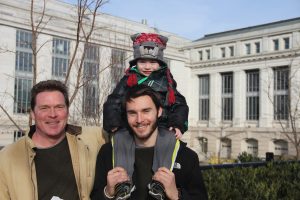When asked to describe himself in an image, Professor Matthew Carnes of the government department responded, “leaning forward,” which captures his desire to connect with people. He added, “My first semester, I taught in ICC auditorium, and I almost fell off the stage almost everyday. I’d walk around, and I’d be right at the edge of the stage the whole time because I wanted to be as close to people as I could be.” Connecting with people, particularly with citizens of Paraguay and a Jesuit priest at Stanford, has greatly influenced Professor Carnes.
As a high school student, Professor Carnes participated in a summer service trip to Paraguay to vaccinate people living near the Brazilian border. One vivid sight captured the inequality between Paraguay and Brazil that he experienced there: “We could stand on the top of the hill in the evening in our town and look out on the horizon and see the lights of Itaipu Dam. Itaipu Dam was the world’s largest hydroelectric dam and was built in between Paraguay and Brazil back in the 80s and had just come online when I was there. Brilliant bright lights, an incredible sight, and we had no electricity in the town where I was staying.” The sight of the dam sparked curiosity about the politics that allow such stark inequality. “I remember, even as a seventeen year old, saying, ‘how can it be that there is that much production there, and none of it’s getting here?’ That has to be a decision of some kind; that doesn’t just happen naturally. What is it that makes this kind of inequality possible and what is it that allows government in non-democratic ways?” In college at Stanford University, Professor Carnes explored these questions raised in Paraguay through his major in International Relations.
In addition to studying politics, he attended mass at Stanford and met the university’s one Jesuit priest. Junior year, Professor Carnes started practicing various Ignatian spiritual exercises to help him discern what to do with life and how to choose well between different paths. “[I] started to develop a real habit of reflection and of prayer that allowed me to go deeper and think about what mattered most to me.” Eventually, he determined four key values: service, academics, friends, and God. “I remember one day going, so who has all those pieces? Wait, it’s this Jesuit guy… Only later did I figure out that there are vows, poverty, chastity and obedience, and that this meant being a priest. Those were all sort of secondary things that really grew on me after I knew this is what’s most important to me.”
As a teacher, Professor Carnes is able to serve students and foster intellectual growth. “I love it when I see students develop a new way of thinking, a new method of thinking, and a new way of understanding themselves.” From day-one, Professor Carnes stresses that each student is a “co-owner” of the world and therefore a “co-responsible.” According to Professor Carnes, among the one of the most important realizations a student can have in his classes “is recognizing where you are in this bigger picture, which is something we can carry throughout the rest of our lives that locates us and inspires us.”
When not in front of a class, Professor Carnes enjoys myriad music genres ranging from 80s and alternative rock to experimental and contemporary hits. Specifically, he enjoys Lost in the Trees’ layered, ethereal sounds and thoughtful lyrics. In December, Professor Carnes looks forward to seeing Natalie Merchant in concert. He also enjoys more popular artists including Mumford and Sons and The Lumineers. “A lot of music I listen to… has a grounding in a lot of heart and a lot of reflection on our place in the world and bigger issues… a sense of being located with a horizon that’s big, that inspires.”
In addition to a diverse musical taste, Professor Carnes enjoys photography as a way to connect with people and their experiences both past and present. Growing up, he would develop black and white film at home. “I think that there’s a texture and a luminosity that we add to film that’s not quite the same in digital.” Over the summer, Professor Carnes digitalized his family photos for his father’s 80th birthday. He admires expressive works by American artists Walker Evans and Dorothy Lange and enjoys visiting the National Gallery.
Whether teaching or enjoying art, Professor Carnes strives to live with “holy boldness.” He explains: “boldness impels you and leads you forward; it’s a willingness to risk. But a holy boldness is grounded in something deeper, in a sense of the sacred and God. So there’s a freedom to express… who one is and who God is. To me that’s really exciting.”
Photo: Georgetown University





